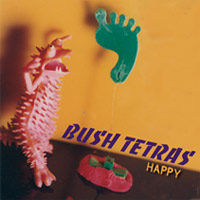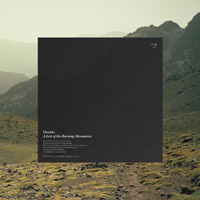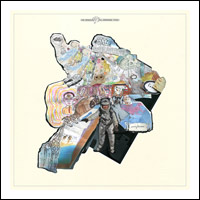
(III)
Casablanca/Republic/Fiction
A mere glance at the cover art for Crystal Castles’ latest album, the aptly titled (III), should give you some indication of the dark sentiments that both drive the record and permeate its lyrics. It borrows from the World Press Photo Award–winning image of a Yemeni woman, Fatima al-Qaws, clutching her wounded son after a demonstration in 2011. It’s a fitting visual acommpaniment to Alice Glass’s varied and oft-quoted proclamations in which she openly begrudges the current state of society. Along with stating the obvious (we all live on the same, doomed planet, am I right?), Glass expresses her desire to become a vigilante. However, the majority of the songs on this latest release don’t reflect any sort of rage or want for revenge, just a sort of resigned sadness to the state of humanity.
Take (III)’s opener, the explosive “Plague,” where Glass’ high-pitched yowl is on display, firmly declaring, “I am the plague.” This is a direction that certainly pays off for the duo. Gone is the electro-schtick, traded for a maturity and utter control of their musical machinations. “Sad Eyes” is a gorgeous amalgamation of trance-groove wrapped in a multi-layered haze. “Kerosene,” following those same lines, climaxes with the jaded affirmation, “I’ll protect you from all the things I’ve seen.” Then there are the softer moments, like “Affection,” with stark, layered vocals. This world-worn darkness coalesces into the understated denouement, “Child I Will Hurt You,” seeing Alice Glass at her most vulnerable, a rare change from her typical ruthless affront.
Expertly mixed and mastered, (III) is suitatable for dancing, especially the straightforward (though no less enjoyable) tracks like “Telepath” and “Violent Youth.” However, it is more than surface pleasure: there is a deep, morose undertone that not even the heaviest of beats can mask. This kind of late-night sound is the opposite of the annoying, oversaturated and overplayed yolo pop; it makes you, instead, recoil into oblivion. In a world inundated with incessant “live in the moment” bullshit, at least Crystal Castles have provided a worthy alternative. Perhaps Alice Glass is a vigilante in more ways that she knows.
Jennifer Farmer
MP3: “Plague”

Happy
ROIR
Blending a frenetic brand of post-punk with a throbbing bassline funk, the Bush Tetras created a song for the ages with “Too Many Creeps,” and the single fittingly sold 30,000 copies for 99 Records on its release in 1980. As such, the 3/4 female band cemented their place in the history of the New York underground that occopied the Lower East Side in the early ’80s.
With renewed interest in the ’90s—perhaps sparked by the success of seeming descendents like Luscious Jackson—the band regrouped in 1995, releasing Beauty Lies on the Polygram-distributed Tim/Kerr label in 1996. The band was slated to release a follow-up for Polygram, but the Seagram’s takeover of the label put the kabosh on such plans and the band dissolved once more. (They reformed again in 2005.)
Happy is that record that never saw the light of day, fittingly rescued from the vaults by ROIR, the label that put out the Bush Tetras’ full-length debut, Wild Things, in 1983. The record was produced by Don Fleming, the Gumball frontman who was making the rounds during that period, overseeing albums by Sonic Youth, Hole, and the Screaming Trees. Unsurprisingly then, Happy is very much of its time, with loud, gritty guitars being more prevalent than the terse riffs and thick bass that once dominated the Bush Tetras’ aesthetic. “Nails” is threaded with grungy guitars, while “Heart Attack” could easily have been a Babes in Toyland outtake. There’s nothing wrong with such moments, but the Bush Tetras benefit when their sound is thinned out. The moody “Slap” is evocative and stirring, while the wiry guitar noise of “Chinese Afro” does more to distinguish the record. But even the sludge-rock of “Swamp Song” is enjoyable, so while Happy doesn’t really add anything to the Bush Tetras’ legacy, nor does it do anything to detract from it.
Stephen Slaybaugh

A List of the Burning Mountains
Jagjaguwar
It should be apparent that after a lengthy and respected career, Oneida rarely spends time looking back. Over the course of 15 years, a dozen albums and a plethora of performances, they have continued to seek new ways to manipulate sound, density and timbre into moments of brilliant cacophony. The uncompromising nature of their music could be considered emblematic of their longstanding presence on the leading edge of Brooklyn’s every evolving independent scene. This is a band that spends a significant amount of time developing the collective instinct to depart from and arrive at musical destinations that are both familiar and distant with ease. In short, they trust themselves more than anyone else—as they very well should.
Their latest release, A List of the Burning Mountains, displays the band, once again, pushing beyond the bounds of structure by investigating the nature of sound and silence. On each of the album’s two side-length songs, synthesized tension is punctuated by rim-shots, cymbal taps and feedback simmering atop an amorphous series of rhythms. The rich warmth of dirty, blooming oscillation echoes into a tonal center like a sort of bizarre tamboura. The simple responsiveness and sensitivity of the performance invokes images of Rashied Ali playing alongside Mike Ratledge and Robert Fripp on an ECM recording.
Seasoned ears will hear how each spin of this record reveals shades of minimal playfulness in undulating concert. Thought not as throbbing as some of their previous efforts, this album is best served with some uninterrupted listening time and limited distractions.
Elijah Vazquez

King Animal
Loma Vista/Republic
There’s a certain inevitability about Soundgarden getting back together. (If current trends continue, at this rate expect an announcement from Daisy Chainsaw.) But the men of Soundgarden did play it a bit closer to the chest. After triumphant Coachella and Lollapalooza sets in 2010, the band stayed relatively quiet, save for some one-off TV appearances, a live album, a new compilation, and a song on last summer’s Avengers soundtrack. Turns out they were actually taking their time on their sixth album, King Animal, their first in 16 years.
One of the tragedies about the quiet implosion of Soundgarden in 1997 was that it didn’t come on the heels of a disappointing record. One could argue that the band had kept evolving on an interesting path and that their strongest work was ahead of them. Strikingly the band’s post break-up endeavors gave no real clues of what could have been. Drummer Matt Cameron joined Pearl Jam and played in Hater with bassist Ben Sheppard. Kim Thayil was the most elusive, appearing sporadically in random guest guitarist roles. Anyone looking for the possible future of Soundgarden would be very confused by singer Chris Cornell, who swung from crooning like Jeff Buckley to befriending Timbaland.
Fans stuck in the ’90s can now breathe a sigh of relief. King Animal picks up right wear Down On the Upside left off. The band wisely sidestepped any attempt to adopt the sonic earmarks of the current millennium. The album gets off to a questionable start with the single, “Been Away Too Long.” It feels as forced as the Eagles’ comeback single, “Get Over It.” Thankfully that song is an aberration, just the sound of the band knocking the cobwebs off. Once that’s out of the way, the band is off to the races. Cornell’s voice has lost none of its paint-peeling power; Sheppard’s bass parts are rock solid and inventive; Cameron is a taut fluid machine; and Thayil delivers some jaw-dropping moments. Lyrically it’s a mixed bag, but then again it always was. While there’s not an obvious hit, the album works as an album. King Animal is the rare reunion that adds to the legacy instead of trying to coast on it.
Dorian S. Ham

Wildlife
Mush
There are some things in this futuristic digital age of music that make me despondent. One of these is the sampled sound of a needle bouncing over a dusty ravine cut into a vinyl record. With just such a sampled sound—akin to Aerosmith dubiously adding wild crowd cheers to their version of “Train Kept A Rollin’”—Wildlife begins ironically rather than sincerely. I don’t have a problem with bedroom-composed electronic music per se, but it burns me when it’s done for a lark and passed off as the next big thing. Thank the gods, then, when the second track, “Cold Shoulder,” starts with a one-string guitar melody ripping through pitch-warped voices and the reverb-drenched harmonies, the pulsing drum beat buried in the mix. This is when I plug it into the big stereo and let the textured moodiness bloom, and this is when Sunglasses set themselves apart from the thievery of yolo pop that is currently murdering alternative music.
Revisiting “Namesake,” the first track, it’s closer to a nod towards Panda Bear, with a passable beat lifted from a thousand backpack hip-hop records. Sunglasses allow themselves to stretch out here too, and ease into the mood, like on the seven and a half minute “Lessons.” The Guaraldi-like cascading piano fits right in with the pillows of steely acoustic guitar and the Bradford Cox in a crowded church vox. These guys are searching in the dark for the right path to follow. Do they keep handing out candy for record labels (the title track) or do they give us a comfy long player of quaalude trips? I’m rooting for the latter, but Wildlife will suffice for now.
Michael O’Shaughnessy
MP3: “Cold Shoulder”
ALBUM REVIEWS
Black Moth Super Rainbow, Cobra Juicy
Woo, It's Cosy Inside
Menahan Street Band, The Crossing
A Midwestern Tribute to Forever Breathes the Lonely Word
Benjamin Gibbard, Former Lives
The Luyas, Animator
King Dude, Burning Daylight
Blueprint, Deleted Scenes
Cemeteries, The Wilderness
Ty Segall, Twins
Tame Impala, Lonerism
Moon Duo, Circles
AC Newman, Shut Down the Streets
Beth Orton, Sugaring Season
